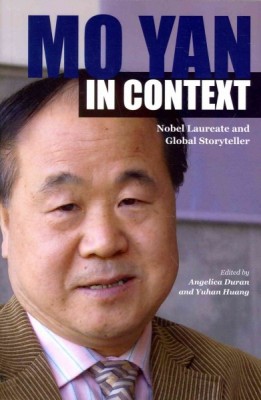| Mo Yan in Context: Nobel Laureate and Global Storyteller Contributor(s): Duran, Angelica (Editor), Huang, Yuhan (Editor) |
|
 |
ISBN: 1557536813 ISBN-13: 9781557536815 Publisher: Purdue University Press OUR PRICE: $29.65 Product Type: Paperback - Other Formats Published: September 2014 |
| Additional Information |
| BISAC Categories: - Literary Criticism | Asian - Chinese - Literary Criticism | Modern - 21st Century - Literary Criticism | Comparative Literature |
| Dewey: 895.135 |
| LCCN: 2014012989 |
| Series: Comparative Cultural Studies |
| Physical Information: 0.6" H x 6" W x 9" (0.85 lbs) 238 pages |
| Themes: - Cultural Region - Chinese |
| Descriptions, Reviews, Etc. |
| Publisher Description: In 2012 the Swedish Academy announced that Mo Yan had received the Nobel Prize in Literature for his work that "with hallucinatory realism merges folk tales, history, and the contemporary." The announcement marked the first time a resident of mainland China had ever received the award. This is the first English-language study of the Chinese writer's work and influence, featuring essays from scholars in a range of disciplines, from both China and the United States. Its introduction, twelve articles, and epilogue aim to deepen and widen critical discussions of both a specific literary author and the globalization of Chinese literature more generally. The book takes the "root-seeking" movement with which Mo Yan's works are associated as a metaphor for its organizational structure. The four articles of "Part I: Leaves" focus on Mo Yan's works as world literature, exploring the long shadow his works have cast globally. Howard Goldblatt, Mo Yan's English translator, explores the difficulties and rewards of interpreting his work, while subsequent articles cover issues such as censorship and the "performativity" associated with being a global author. "Part II: Trunk" explores the nativist core of Mo Yan's works. Through careful comparative treatment of related historical events, the five articles in this section show how specific literary works intermingle with China's national and international politics, its mid-twentieth-century visual culture, and its rich religious and literary conventions, including humor. The three articles in "Part III: Roots" delve into the theoretical and practical extensions of Mo Yan's works, uncovering the vibrant critical and cultural systems that ground Eastern and Western literatures and cultures. Mo Yan in Context concludes with an epilogue by sociologist Fenggang Yang, offering a personal and globally aware reflection on the recognition Mo Yan's works have received at this historical juncture. |